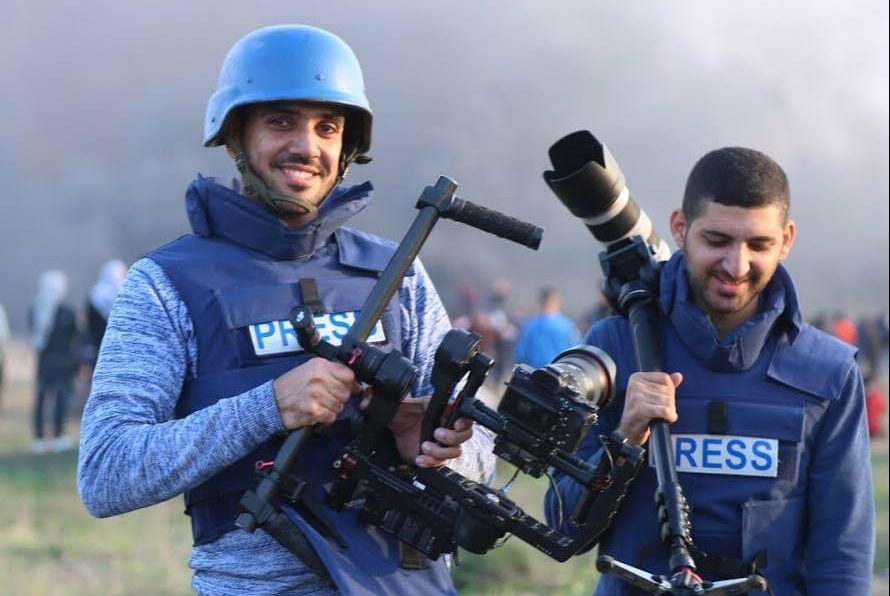The killing of Palestinian journalist Duaa Sharaf and her son raised the number of journalists killed by the deadly Israeli aggression to 24.
The Committee to Protect Journalists (CPJ) has warned that current Israeli aggression on the besieged Gaza Strip has become the deadliest time on record for members of the press.
Speaking to NPR, CPJ Emergencies Director Lucy Westcott said “This is the deadliest time we have on record regarding threats to journalists”, reflecting alarming spike in fatalities among journalists.
Westcott confirmed that so far, 24 journalists have lost their lives, according to CPJ’s count. Out of the 24, 20 were Palestinian, while three were Israeli and one was Lebanese.
However, these statistics represent just the tip of the iceberg. Westcott warned that CPJ is currently investigating around 100 additional reports of journalists killed, missing, detained, or threatened.
The Palestinian journalists, who have overwhelmingly borne the brunt of the fatal onslaught, are predominantly based in Gaza, where Israel has launched a brutal bombing campaign that has killed more than 7,028 Palestinians, including 2,913 children.
“They are incredibly vital to the world’s understanding of what’s going on on the ground in Gaza,” she stated.
Westcott also revealed that nearly 48 media offices and homes in Gaza have either been damaged or completely obliterated. The accounts point to a more systematic targeting strategy that imperils not just reporters, but also the very infrastructure that supports free reporting.
The Arab and Middle Eastern Journalists Association (AMEJA) stated, “Targeting journalists is a stark violation of press freedom and international human rights law,” advocating for “swift, thorough, and transparent investigations.”
Likewise, the Foreign Press Association called on Israel to ensure the safety and freedom of their Palestinian members reporting from dangerous conditions in Gaza.
CPJ’s warning came after Al Jazeera Gaza’s bureau chief Wael Dahdouh lost at least four members of his family —wife, son, daughter, and infant grandson—in an Israeli airstrike as they sheltered in a temporary house in the south of Gaza, which Israel had claimed is a safe zone.
Experts believe that the targeting was not random. “Rather than target him, the army targeted his wife and 2 kids to silence him. Thus, it can claim it did not target a journalist,” said Sami Hermez on X, formerly known as Twitter.
Palestinian journalist Duaa Sharaf and her child were also killed after an Israeli airstrike targeted their home in Gaza’s Al-Zawaida area, bringing the number of journalists killed in Gaza to 24, according to Palestinian sources.
Also on Wednesday, Mohamed AlFarra, a cameraman in Ramallah, after he received news that his sister, her husband & kids were all killed in an airstrike in Khan Younis.
On Monday, Roshdi Sarraj, a Palestinian journalist, filmmaker, and Ain Media co-founder, was killed in an Israeli airstrike in Gaza City.
His death comes five years after Yaser Murtaja, Ain Media’s other co-founder, was killed by Israeli forces at the Gaza Strip’s border.
Ain Media said Sarraj was a “brilliant photo-journalist and filmmaker,” stating, “With the killing of Roshdi, Ain Media loses another precious part of its soul.”
Two weeks ago, Reuters video journalist Issam Abdallah was killed and six other journalists injured in southern Lebanon after an Israeli attack.
Freelance journalists are particularly at risk
Westcott also highlighted the precarious situation of freelance local and photojournalists. “Because of the very nature of their work,” she noted, “they are particularly at risk,” often finding themselves close to the line of fire to document the events.
The CPJ’s investigations divulged that some journalists were shot while reporting on the deadly war, while others lost their lives in airstrikes—sometimes along with their families.
As the CPJ closely monitors the situation, Westcott cautioned that the dynamics for journalists’ safety could drastically change if Israel opts for a threatened ground invasion, further exacerbating an already perilous environment for those committed to revealing the truth.
A report released earlier this year by CPJ shed light on the death of Shireen Abu Akleh, a Palestinian American journalist with Al Jazeera, affirming that “to date, no one has been held accountable” for her killing or those of at least 20 other journalists murdered by Israel since 2001.
Notably, the killing of Dahdouh’s family occurred hours after Al Jazeera welcomed the findings of the Independent International Investigative Committee of the United Nations, which recognised that the IOF used “lethal force without justification” when they shot and killed Al Jazeera journalist Shireen Abu Akleh last year.







